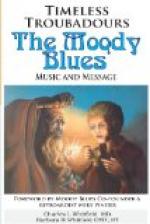Quant vey la lauzeta mover De joi sas alas contral rai, que s’oblida e.s laissa cazer per la doussor qu’al cor li vai, ai! tan grans enveia m’en ve de cui qu’eu veya jauzion! meravilhas ai, quar desse lo cor de dezirier no.m fon.
“When I see the lark flutter with joy towards the sun, and forget himself and sing for the sweetness that comes to his heart; alas, such envy comes upon me of all that I see rejoicing, I wonder that my heart does not melt forthwith with desire".[20]
At the same time Bernard’s style is simple and clear, though he shows full mastery of the complex stanza form; to call him the Wordsworth of the troubadour world is to exaggerate a single point of coincidence; but he remains the greatest of troubadour poets, as modern taste regards [50] poetry.
Arnaut de Mareuil (1170-1200 circa) displays many of the characteristics which distinguished the poetry of Bernard of Ventadour; there is the same simplicity of style and often no less reality of feeling: conventionalism had not yet become typical. Arnaut was born in Perigord of poor parents, and was brought up to the profession of a scribe or notary. This profession he soon abandoned, and his “good star,” to quote the Provencal biography, led him to the court of Adelaide, daughter of Raimon V. of Toulouse, who had married in 1171 Roger II., Viscount of Beziers. There he soon rose into high repute: at first he is said to have denied his authorship of the songs which he composed in honour of his mistress, but eventually he betrayed himself and was recognised as a troubadour of high merit, and definitely installed as the singer of Adelaide. The story is improbable, as the troubadour’s rewards naturally depended upon the favour of his patrons to him personally; it is probably an instance of the manner in which the biographies founded fictions upon a very meagre substratum of fact, the fact in this instance being a passage in which Arnaut declares his timidity in singing the praise of so great a beauty as Adelaide.
Mas grans paors m’o tol e grans
temensa, [51]
Qu’ieu non aus dir, dona, qu’ieu
chant de vos.
“But great fear and great apprehension comes upon me, so that I dare not tell you, lady, that it is I who sing of you.”
Arnaut seems to have introduced a new poetical genre into Provencal literature, the love-letter. He says that the difficulty of finding a trustworthy messenger induced him to send a letter sealed with his own ring; the letter is interesting for the description of feminine beauty which it contains: “my heart, that is your constant companion, comes to me as your messenger and portrays for me your noble, graceful form, your fair light-brown hair, your brow whiter than the lily, your gay laughing eyes, your straight well-formed nose, your fresh complexion, whiter and redder than any flower, your little mouth, your fair teeth, whiter than pure silver,... your fair white




